The grain corridor in the Black Sea in April-May 2023: Russia’s ultimatum demanding the lifting of sanctions
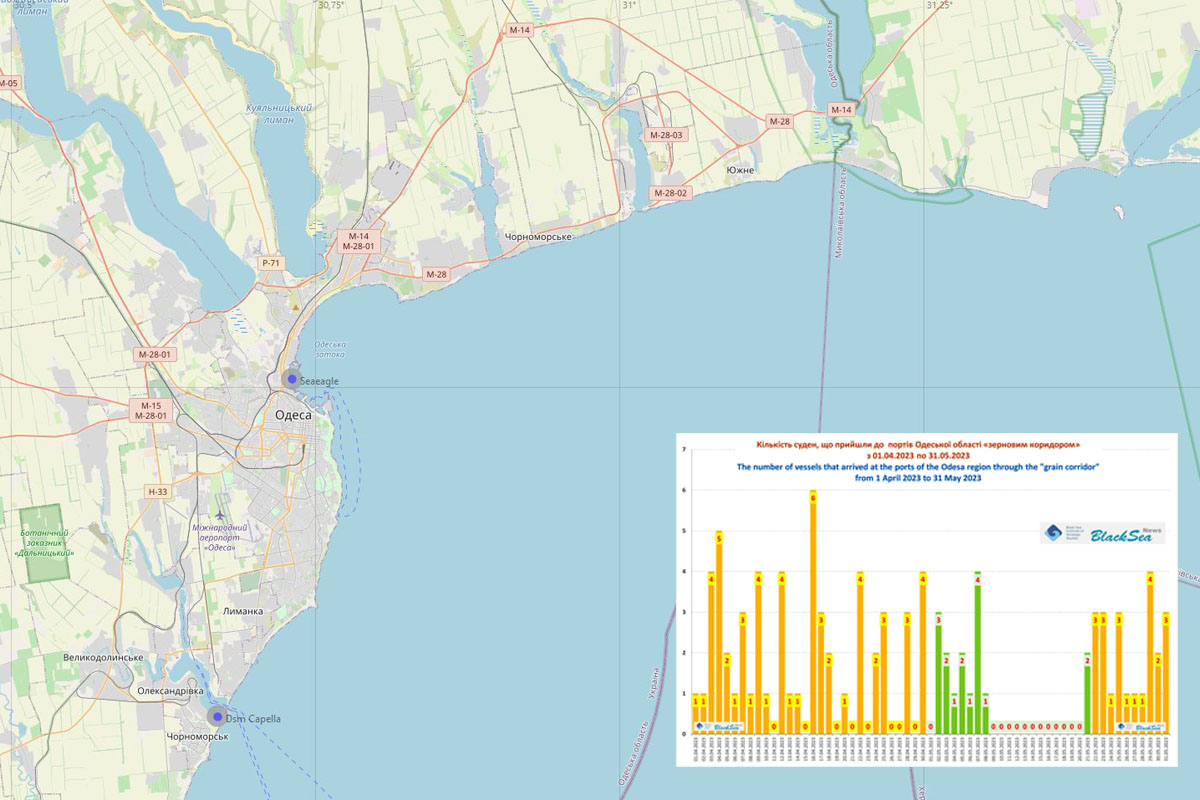
The Monitoring Group of BlackSeaNews
and the Black Sea Institute of Strategic Studies
The Monitoring Group of the Black Sea Institute of Strategic Studies and BlackSeaNews, based on the results of its own monitoring, reports on the main trends in the operation of the grain corridor from Ukrainian ports in the Odesa region in April-May 2023.
Summary
No ships arrived at Ukrainian ports in the Odesa region through the grain corridor from 9 to 20 May 2023. There have been no interruptions for such a long time since the beginning of the Black Sea Grain Initiative. On 13 April 2023, Russia for the first time formally compiled an extended and detailed list of demands for the lifting of sanctions in return for its further participation in the Grain Initiative. Russia presented these demands in the form of an ultimatum to the UN Secretariat, although it could not help but understand that this international institution cannot resolve the issue of easing sanctions.
The average number of vessels arriving per day at the three ports of the Odesa region as part of the Black Sea Grain Initiative decreased from 5.9 vessels per day in September 2022 to 1.9 in April 2023.
Russia's complaints that sanctions have hindered exports of its agricultural products were completely false, as Russian statistics for 2022 and January-April 2023 indicate the opposite. In 2022, grain cargo turnover of Russian seaports increased by 6.4% year-on-year and amounted to 45.1 million tons. In 2022, mineral fertilisers cargo turnover rose by 25.1% and reached 24.2 million tons. The indicators for the first 4 months of 2023 were even higher. In January-April 2023, grain transshipment in Russian ports increased by 2.1 times to 22.4 million tons, and the transshipment of mineral fertilisers increased by 1.7 times to 10.5 million tons.
Russia started the negotiation process on the Grain Initiative in the form of an ultimatum in order to play for time until the presidential election in Turkey, in which the position of President Erdogan – the main figure behind the launch and operation of the Grain Initiative – was considered uncertain.
However, on 17 May 2023, the Turkish president announced that Russia had agreed to a two-month extension of the agreement, i.e., until 17 July 2023. The next day, on 18 May, the Russian Foreign Ministry stated that in response to requests primarily from its Turkish partners, Russia confirmed the renewal of the agreement for another two months, until 17 July inclusive, without any changes. At the same time, the Russian Foreign Ministry reiterated that without the fulfilment of Russia’s previous requirements, "there can be no talk of expanding the Black Sea Initiative in principle...The agreement will be terminated after July 17.”
This should be seen as Putin's "political gift" to Erdogan before the second round of presidential elections in Turkey, which will take place on 28 May, and at the same time, as a demonstration of Russia's confidence in Erdogan's victory.
As early as 21 May 2023, the mass media reported that a delegation of the presidents of South Africa, Senegal, Egypt, the Republic of Congo, Uganda, and Zambia was going to hold talks with Kyiv and Moscow in order to "initiate the peace process" and "raise the difficult issue of how Russia, which is under heavy sanctions, can be paid to export fertilisers that Africa desperately needs.” It was also reported that the African leaders would discuss the related issue of facilitating the transit of more consignments of grain from Ukraine in the conditions of war and the possibility of a larger exchange of prisoners of war.
Thus, with the help of the presidents of African countries, Russia is making another attempt to push through the same conditions for the extension of the grain agreement that it put forward in April 2023 as an ultimatum to the UN Secretariat. At the same time, through the African delegation, hints at a ceasefire, a large exchange of prisoners of war, and the expansion of the grain agreement have been added to the agenda.
The full text of the analytical report
Important notes and explanations:
On 22 July 2022, an initiative on the safe transportation of grain and foodstuffs from the ports of Odesa, Chornomorsk, and Pivdennyi (participants – Ukraine, Turkey, the United Nations, and the Russian Federation) was officially launched in Istanbul for a period of 120 days, i.e., until 22 November 2022. As part of the initiative, the first ship with Ukrainian agricultural products departed from the port of Odesa on 1 August 2022.
The inspection procedure is defined by a document entitled the Initiative on the Safe Transportation of Grain and Foodstuffs from Ukrainian Ports, which was signed on 22 July 2022 in Istanbul. The document states:
“A. <...> Prior to operations commencing, a coordination structure will be established. A Joint Coordination Centre (JCC) shall be set up in Istanbul under the auspices of the United Nations and include representatives of the Parties and the United Nations. The JCC shall conduct general oversight and coordination of this Initiative. Each Party and the United Nations will be represented in the JCC by one senior official and an agreed upon, required number of personnel.
B. Inspection teams will be set up in Türkiye. The inspection teams in Türkiye will consist of representatives from all Parties and the UN. Vessels will transit to and enter the Ukrainian ports in line with the JCC-approved schedule upon the vessels' inspection by an Inspection Team. The primary responsibility of the Inspection Teams will be to check for the absence of unauthorised cargoes and personnel on board vessels inbound to or outbound from the Ukrainian ports.
D. Merchant vessels will be prior registered in the JCC, verifying their details and confirming their loading port, having liaised closely with port authorities. Vessels will be technically monitored for the duration of their passage. Vessels will proceed through the maritime humanitarian corridor, agreed by all Parties. The JCC will develop and disseminate a detailed operational and communications plan, including identification of safe harbours and medical relief options.
G. All merchant vessels taking part in this Initiative shall be subject to inspection conducted by an Inspection Team in the harbours determined by Türkiye at the entry/exit to/from the Turkish strait.”
On 19 November 2022, the Grain Initiative was extended for another 120 days. On 19 March 2023, it was renewed once again for 120 days according to Ukraine, and for 60 days, which ended on 18 May 2023, according to Russia.
* * *
The primary goal of this study, similarly to the previous ones, is to detect trends in the main (in our opinion) indicator that characterises the operations of the grain corridor – the average number of vessels arriving per day at the three ports of the Odesa region as part of the agreement.
Note that we consider the indicator of the number of ships arriving at Ukrainian ports as one of the indicators of the level of military risks in the Black Sea region.
The results presented below are quite telling (See Figure 1).
-
September 2022 – 176 vessels, 5.9 vessels per day;
-
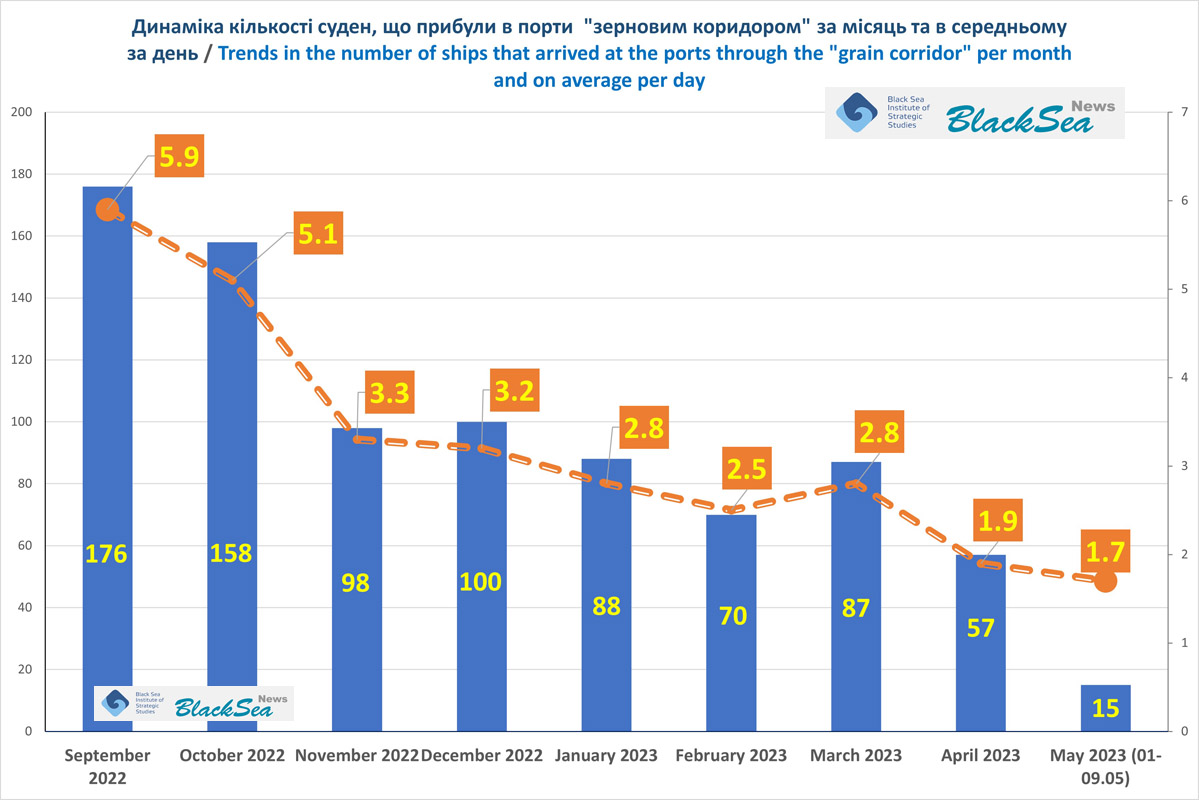 October 2022 – 158 vessels, 5.1 vessels per day;
October 2022 – 158 vessels, 5.1 vessels per day; -
November 2022 – 98 vessels, 3.3 vessels per day;
-
December 2022 – 100 vessels, 3.2 vessels per day;
-
January 2023 – 88 vessels, 2.8 vessels per day;
-
February 2023 – 70 vessels, 2.5 vessels per day;
-
February 2023 – 70 vessels, 2.5 vessels per day;
-
April 2023 – 57 vessels, 1.9 vessels per day;
-
1-9 May 2023 – 15 vessels, 1.66 vessels per day. After that, the calculation of this indicator lost its meaning (see below).
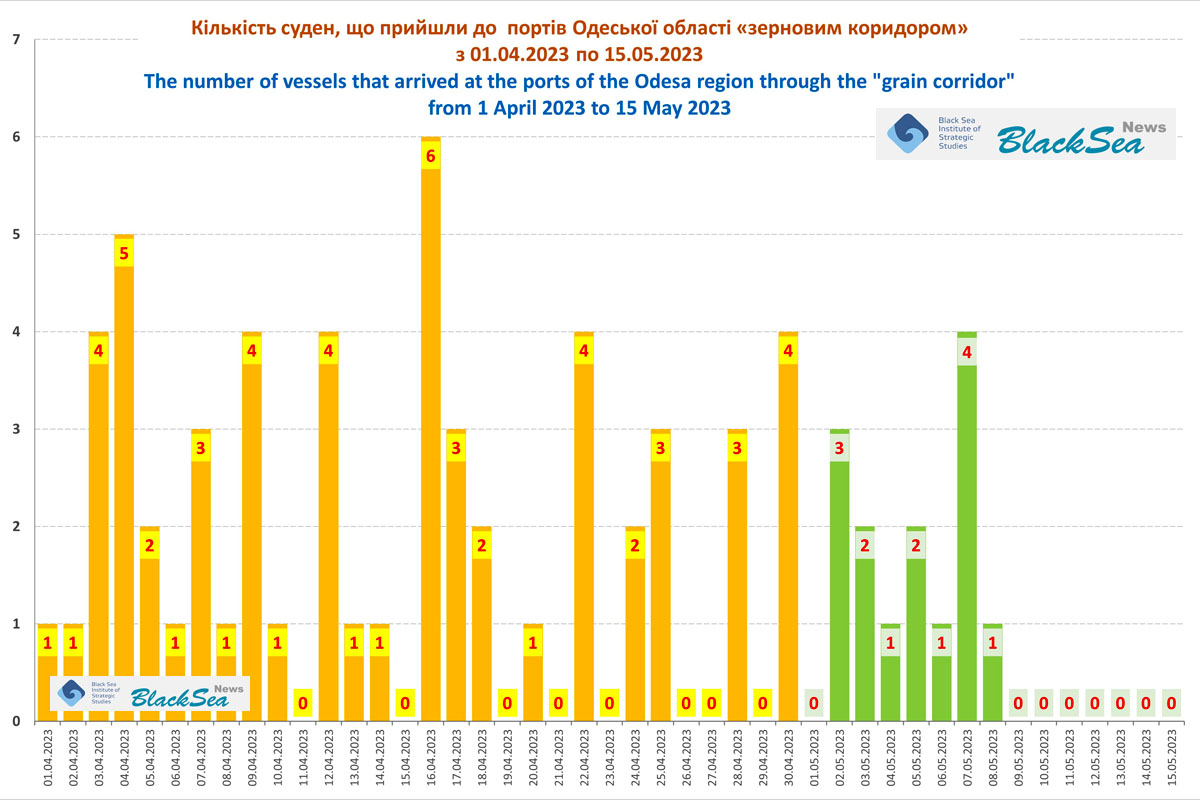 The results of monitoring the number of vessels arriving at the Ukrainian ports of the Odesa region through the grain corridor in April-May 2023 (from 1 April 2023 to 15 May 2023) are provided in Figure 2.
The results of monitoring the number of vessels arriving at the Ukrainian ports of the Odesa region through the grain corridor in April-May 2023 (from 1 April 2023 to 15 May 2023) are provided in Figure 2.
In 45 days – from the beginning of April to 15 May 2023 inclusive – there were 16 days when no ships arrived at the ports due to the blocking of inspections by Russian JCC inspectors under various pretexts.
It should be noted that no ships arrived at the Ukrainian ports in the Odesa region through the grain corridor from 9 to 15 May 2023. There have been no interruptions for such a long time since the beginning of the Black Sea Grain Initiative.
The first day of such blocking by Russian inspectors was 11 April 2023.
The pretext for this was the official note by Stéphane Dujarric, the spokesman for the UN Secretary-General, which was issued on this very day: :
111 April 2023, New York
Stéphane Dujarric, Spokesman for the Secretary-Genera
“The Joint Coordination Centre (JCC) has not been able to conduct inspections today as the parties needed more time to reach an agreement on operational priorities. Following intensive discussions within the JCC, supported by the United Nations and Türkiye, routine inspections are planned to resume tomorrow, Wednesday, 12 April. We urge all involved to meet their responsibilities to ensure that vessels continue to move smoothly and safely in the interest of global food security.
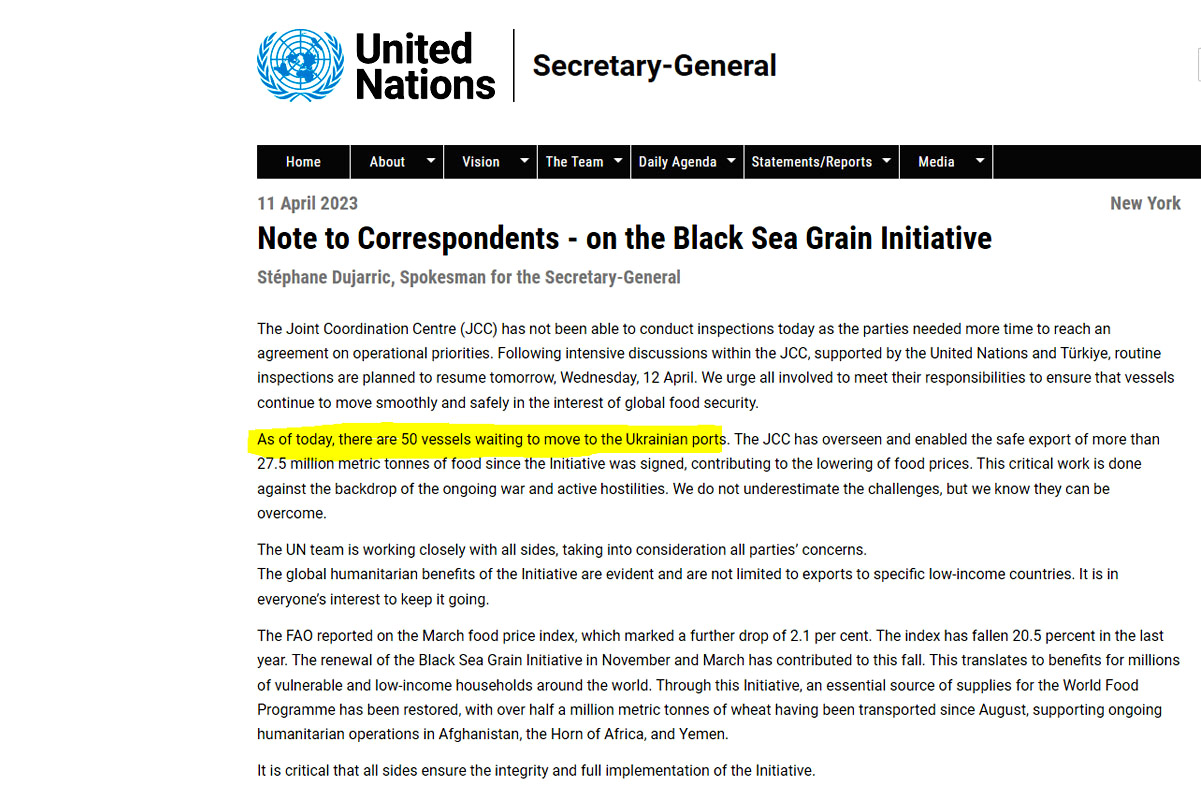 As of today, there are 50 vessels waiting to move to the Ukrainian ports*. The JCC has overseen and enabled the safe export of more than 27.5 million metric tonnes of food since the Initiative was signed, contributing to the lowering of food prices. This critical work is done against the backdrop of the ongoing war and active hostilities. We do not underestimate the challenges, but we know they can be overcome.
As of today, there are 50 vessels waiting to move to the Ukrainian ports*. The JCC has overseen and enabled the safe export of more than 27.5 million metric tonnes of food since the Initiative was signed, contributing to the lowering of food prices. This critical work is done against the backdrop of the ongoing war and active hostilities. We do not underestimate the challenges, but we know they can be overcome.
The UN team is working closely with all sides, taking into consideration all parties’ concerns. The global humanitarian benefits of the Initiative are evident and are not limited to exports to specific low-income countries. It is in everyone’s interest to keep it going..
The FAO** reported on the March food price index, which marked a further drop of 2.1 percent. The index has fallen 20.5 percent in the last year. The renewal of the Black Sea Grain Initiative in November and March has contributed to this fall. This translates to benefits for millions of vulnerable and low-income households around the world. Through this Initiative, an essential source of supplies for the World Food Programme has been restored, with over half a million metric tonnes of wheat having been transported since August, supporting ongoing humanitarian operations in Afghanistan, the Horn of Africa, and Yemen.
It is critical that all sides ensure the integrity and full implementation of the Initiative.”
* * Marking in bold and highlighting – by BlackSeaNews.
** The Food and Agriculture Organization of the United Nations (FAO)
Why do we believe that this UN press release became the formal pretext for Russia to suspend its participation in ship inspections, which, by the way, happened for the first time?
Because on 13 April 2023, the Russian Foreign Ministry's official response to this press release was published. And in this response, along with accusations against the UN Secretariat, the Russian ultimatum regarding the continuation of the Grain Initiative was delivered for the first time.
Let us carefully read the text of the Russian ultimatum (see the full version at the link or in the photo; marking in colour – by BlackSeaNews).
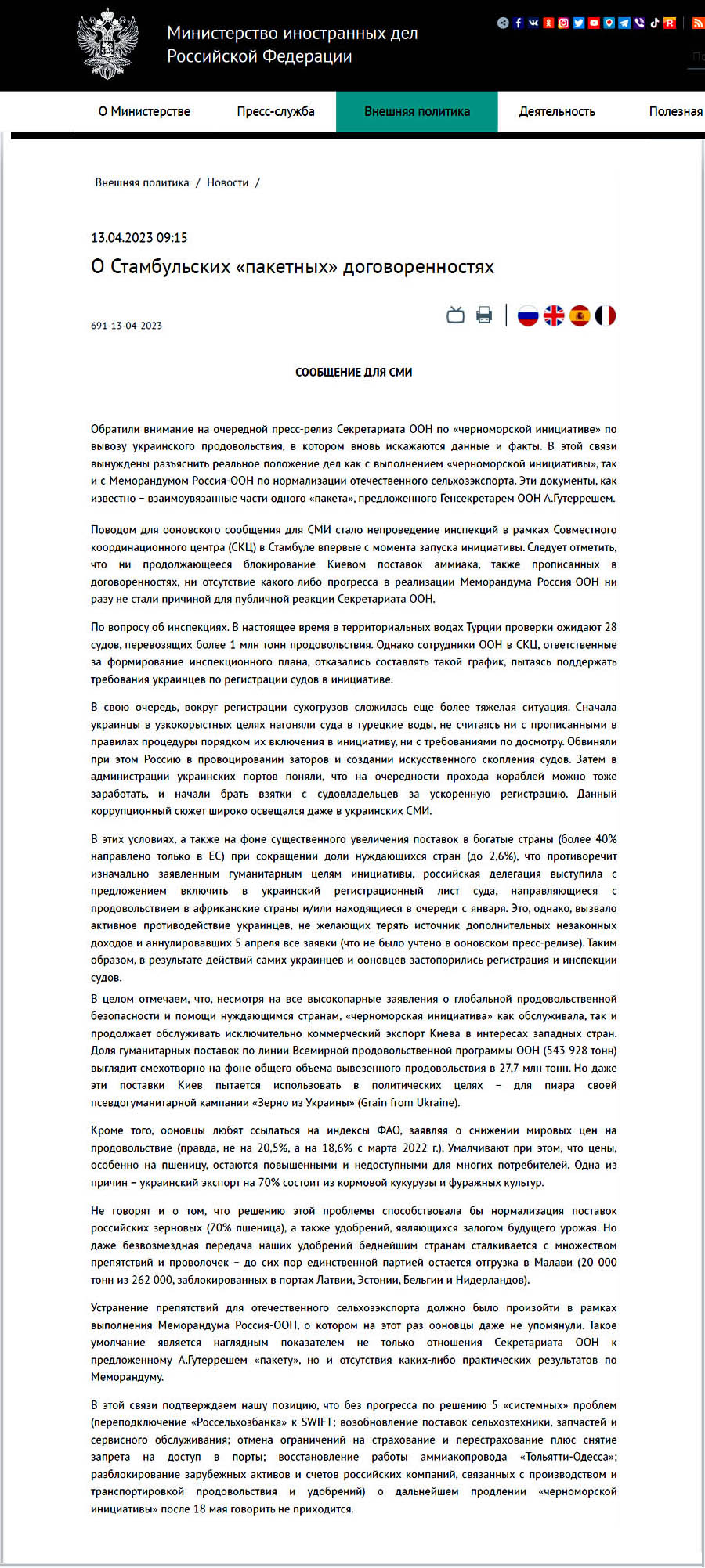 The Ministry of Foreign Affairs of the Russian Federation
The Ministry of Foreign Affairs of the Russian Federation
Press release on the Istanbul package agreements
13.04.2023 09:15
“We noted the latest press release from the UN Secretariat on the Black Sea Initiative for the export of Ukrainian food, which once again distorts data and facts. In this regard, we have to clarify the real state of affairs both with the implementation of the Black Sea Initiative and with the Russia-UN Memorandum on promoting domestic agricultural exports. These documents, as is known, are interconnected parts of the package proposed by UN Secretary-General Antonio Guterres.
The UN press release addresses the failure to carry out inspections at the Joint Coordination Centre (JCC) in Istanbul for the first time since the initiative launched. It must be noted that neither Kiev’s continued blocking of ammonia supplies, also prescribed in the agreements, nor the lack of any progress in the implementation of the Russia-UN Memorandum has ever caused the UN Secretariat to make a public response.
About the inspections. Today, 28 ships carrying more than 1 million tonnes of food are awaiting inspection in Turkish territorial waters. However, the UN staff at the JCC, which is responsible for the inspection plan, has refused to draw up such a schedule, trying to support the Ukrainians' demands for the registration of ships engaged in the initiative...
....
The removal of obstacles to Russian agricultural exports was supposed to take place as part of the Russia-UN Memorandum, which the UN did not even mention this time. Such silence is not only a clear indicator of the UN Secretariat's attitude to the package Antonio Guterres proposed, but also of the absence of any practical results regarding the Memorandum.
In this context, Russia reaffirms its position that there can be no discussion of the Black Sea Initiative after May 18 without any progress regarding the five systematic problems (reconnecting Rosselkhozbank to SWIFT; resuming supplies of agricultural machinery, spare parts and maintenance service; lifting restrictions on insurance and reinsurance, plus unblocking access to ports; restoring the work of the Tolyatti-Odessa ammonia pipeline; and unblocking foreign assets and accounts of Russian companies related to the production and transportation of food and fertilisers).”
Thus, on 13 April 2023, Russia formally compiled an extended and detailed list of demands for the lifting of sanctions in return for its further participation in the Grain Initiative. It was done in the form of an ultimatum to the UN Secretariat.
It contains 6 points, which are presented below.
-
Reconnecting Rosselkhozbank to SWIFT.
-
Resuming supplies of agricultural machinery, spare parts, and maintenance service.
-
Lifting restrictions on insurance and reinsurance.
-
Unblocking access to ports.
-
Restoring the work of the Tolyatti-Odesa ammonia pipeline.
-
Unblocking foreign assets and accounts of Russian companies related to the production and transportation of food and fertilisers.
A few important points are worth making.
In the document signed in Istanbul by Russia and the UN Secretariat and entitled the Memorandum of Understanding between the Russian Federation and the UN Secretariat on assistance in promoting Russian food and fertilisers on global markets, the above-mentioned list of Russia's conditions is missing, as well as the obligations of the UN Secretariat to meet any Russian demands.
The document states:
“(2). The Secretariat agrees to carry on its efforts to promote transparent and unfettered supply of food and fertilisers, including source materials for their production (including ammonia), coming from the Russian Federation to global markets. These efforts include, in particular, efforts to help remove obstacles that may arise in finance, insurance or logistics.
The Secretariat will strive to work with the competent authorities and the private sector to achieve specific exemptions for food and fertilisers, including source materials for their production (including ammonia) produced in the Russian Federation, from measures taken with regard to the Russian Federation in accordance with the principle that these measures do not apply to food and fertilisers, thereby facilitating unfettered exports of Russian food and fertilisers, including source materials for their production (including ammonia), to global markets taking into account the urgent need related to global food security, and the existing needs of the corresponding producers and sellers of food and fertilisers in the Russian Federation.
The Secretariat will advise Russian companies on doing business with the United Nations and on the procedure and requirements needed for becoming a registered supplier.”
In addition, paragraph 4 of the Memorandum states that “this Memorandum is not an international treaty and does not establish any rights or obligations under international law.”
It is hard to imagine that Russia seriously hoped that the UN Secretary-General would be able to solve the issue of lifting sanctions on the 6 points listed in the ultimatum. And this did not happen.
-
According to information agencies, the UN Secretary-General requested three American banks to replace SWIFT and help Rosselkhozbank (Russian Agricultural Bank) process export operations.
-
At the end of April 2023, the main US sanctions agency OFAC granted the American bank JPMorgan Chase & Co one-time permission to process a payment from Rosselkhozbank for operations with Russian grain, and at the beginning of May, it authorised another 40 payments.
-
In early May 2023, the Russian side received information that the Turkish state Ziraat Bank could be an intermediary in making payments of Rosselkhozbank, but the Turkish side, after consultations with the United States and the United Nations, reported that Ziraat Bank would be an intermediary on condition that the United States and the UN approved every transaction…
Russia's complaints that sanctions have hindered exports of its agricultural products were completely false, as Russian statistics for 2022 and January-April 2023 indicate the opposite.
-
In 2022, grain cargo turnover of Russian seaports increased by 6.4% year-on-year and amounted to 45.1 million tons.
-
In 2022, mineral fertilisers cargo turnover rose by 25.1% and reached 24.2 million tons.
-
In January-April 2023, grain transshipment in Russian ports increased by 2.1 times to 22.4 million tons, and the transshipment of mineral fertilisers increased by 1.7 times to 10.5 million tons.
As of 15 May 2023, we made the following conclusions:
-
When Russia issued this ultimatum on sanctions and grain, its leaders could not help but understand that it would not be accepted.
-
Russia could not help but realise that the UN Secretariat and the UN Secretary-General are not the institutions that can resolve the issue of easing sanctions.
-
In April-May 2023, Russia started the negotiation process on the grain deal in the form of an ultimatum in order to play for time until the presidential election in Turkey, in which the position of Erdogan – the main figure behind the launch and operation of the Grain Initiative – was already considered uncertain.
-
Therefore, at least until the end of the election race and the formation of a new Turkish government, it will be difficult for the UN Secretariat and Turkey to resume negotiations on grain.
-
Thus, so far, as of 15 May 2023, it looks unlikely that grain exports from Ukrainian ports will be restarted.
However, in 2 days, there were significant changes in the situation with the grain agreement.
-
On 17 May 2023, the Turkish president announced that Russia had agreed to a two-month extension of the agreement, i.e., until 17 July 2023.
-
On 18 May 2023, the Russian Foreign Ministry stated: “…in response to requests primarily from our Turkish partners as a party to the agreement, we confirmed the renewal of the agreement for another two months through July 17 without any changes.” (https://mid.ru/ru/foreign_policy/news/1871129/?lang=en)
-
At the same time, the Russian Foreign Ministry reiterated all the points of the above-mentioned ultimatum and stated that “there can be no talk of expanding the Black Sea Initiative in principle without these requirements first being met. The agreement will be terminated after July 17.”
-
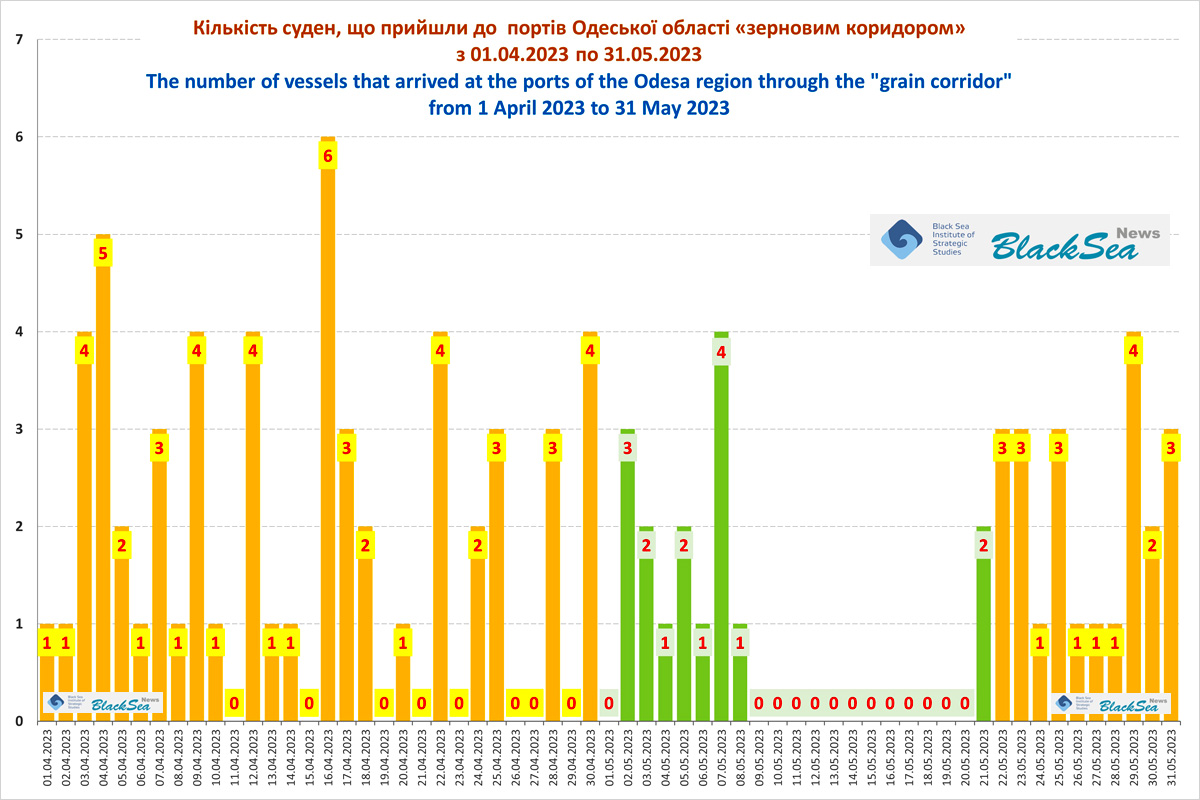 On 21 May 2023, the first ships arrived at the ports of the Odesa region after a 12-day break caused by the refusal of Russian inspectors at the JCC to conduct ship inspections.
On 21 May 2023, the first ships arrived at the ports of the Odesa region after a 12-day break caused by the refusal of Russian inspectors at the JCC to conduct ship inspections. -
At the same time, Russia didn’t allow ships to sail to the port Pivdennyi. Russia explained this by its demand to resume the work of the ammonia pipeline Tolyatti-Odesa, the final terminal of which is located in the port Pivdennyi.
-
On 21 May 2023, the mass media reported that a delegation of the presidents of South Africa, Senegal, Egypt, the Republic of Congo, Uganda, and Zambia was going to hold talks with Kyiv and Moscow in order to "initiate the peace process" and "raise the difficult issue of how Russia, which is under heavy sanctions, can be paid to export fertilisers that Africa desperately needs.”
-
It was also reported that the African leaders would discuss the related issue of facilitating the transit of more consignments of grain from Ukraine in the conditions of war and the possibility of a larger exchange of prisoners of war.
Conclusions as of 31 May 2023
The extension of the grain agreement by Russia without any additional conditions should be seen as Putin's “political gift” to Erdogan before the second round of presidential elections in Turkey, which will take place on 28 May, and at the same time, as a demonstration of Russia's confidence in Erdogan's victory.
With the help of the presidents of African countries, Russia is making another attempt to push through the same conditions for the extension of the grain agreement that it put forward in April 2023 as an ultimatum to the UN Secretariat.
At the same time, through the African delegation, hints at a ceasefire, a large exchange of prisoners of war, and the expansion of the grain agreement have been added to the agenda. Most likely, the inclusion of Mykolaiv ports in the agreement is implied.
* * *
The results of monitoring the number of vessels arriving at the Ukrainian ports of the Odesa region through the grain corridor in September 2022 – April 2023 are provided in Figure 3.
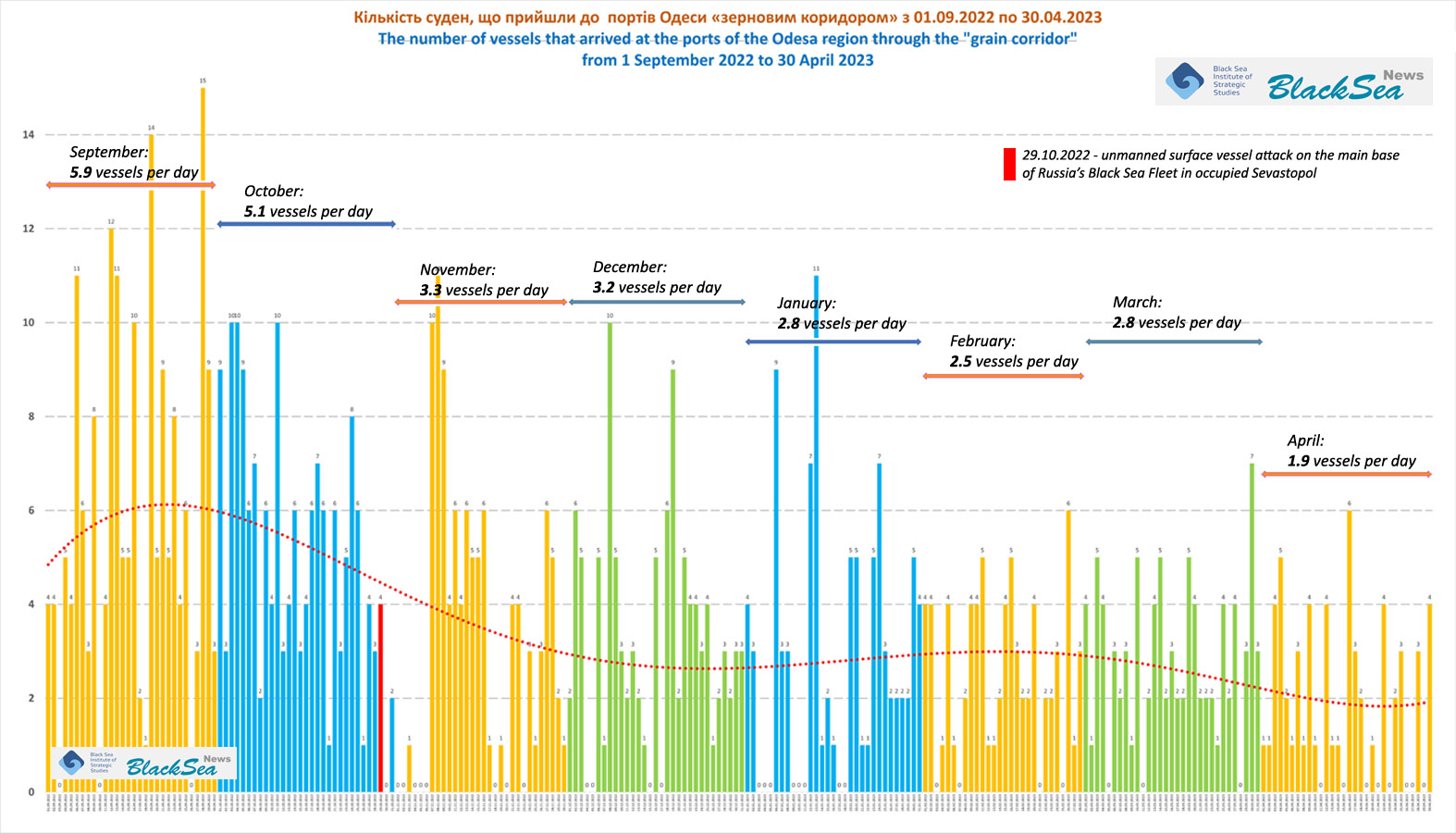
* * *
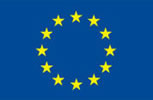 This article has been prepared with the support of the European Union in Ukraine. The content of the article is the sole responsibility of the authors and does not necessarily reflect the position of the EU
This article has been prepared with the support of the European Union in Ukraine. The content of the article is the sole responsibility of the authors and does not necessarily reflect the position of the EU
More on the topic
- 02.08.2023 The grain corridor in the Black Sea in June – July 2023: The final statistics and database
- 17.03.2023 The Black Sea «Grain Corridor» between September 2022 - March 2023 — New Highlights
- 22.01.2023 The "grain corridor" in the Black Sea in September-December 2022. Important statistics
- 01.11.2022 The “grain corridor”: Russia has artificially increased the waiting time for the inspection of ships carrying Ukrainian grain in the Sea of Marmara